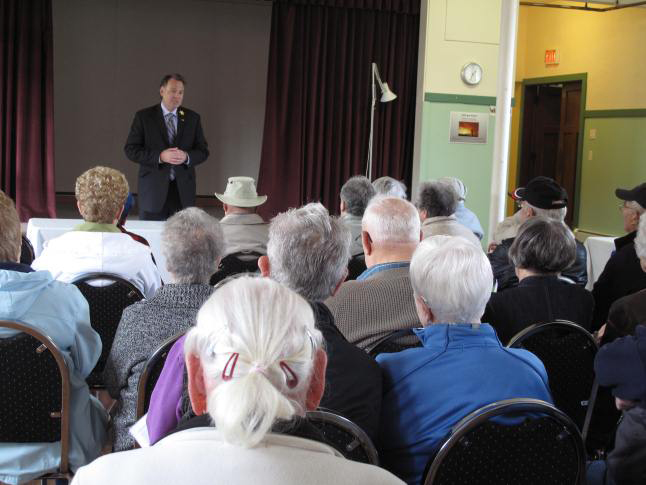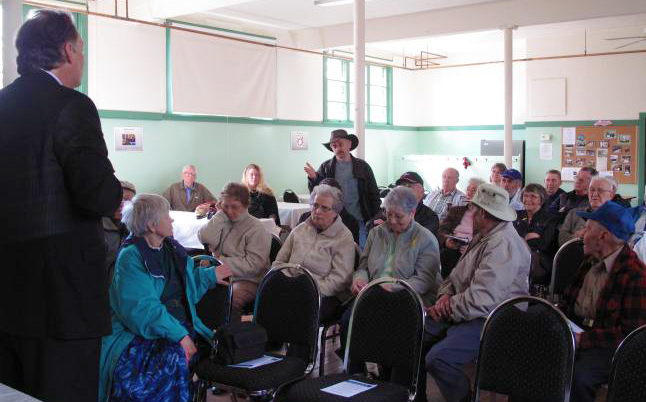
By Laura Stovel

Ninety-three-year-old John Augustyn is a remarkable man. Fiercely independent, he almost single-handedly grows one of the most productive vegetable gardens in town and he can often be seen repairing some old equipment that someone has discarded: with him, nothing goes to waste.
And once or twice a week he slowly pulls his grey 1992 Ford Crown Victoria sedan out of his garage and drives to the grocery store or to the hospital. “I restrict my own driving,” he said. “I don’t drive on the highway or at night or in the rain. I just drive in town during the day.”
But, like many seniors, Mr. Augustyn is worried. Since the BC government signed a contract with a company called DriveAble in 2010, seniors 80 and older are faced with the real fear of losing their driving licenses in a system that seems patently unfair and discriminatory.
Under the new system, once seniors turn 80 they need to visit their doctor every two years for a cognitive assessment. The doctor submits a report to the Office of the Superintendent of Motor vehicles and that office decides whether the senior needs to take a DriveAble test. This all seems reasonable, but then the system becomes problematic.
Seniors who have to take the DriveAble test are required to go to Kelowna twice: first to take a computerized test; the second time to take a road test in a city that is very different from the driving conditions in Revelstoke. For many, this is a very stressful experience, and that stress and confusion often results in failed tests.

MLA Norm MacDonald met with around 30 seniors on Friday to hear their concerns and provide information. “No one is saying that unsafe drivers should be allowed to drive. The ability to drive is not a right, but a privilege.” However, the way drivers are assessed needs to be fair and accurate, he said.
There are several problems with the DriveAble system, he said. There are concerns about the way the contract was awarded. DriveAble is a private company based in Edmonton which was given a direct award contract, which is not the way such contracts could be done. “As MLAs, we don’t know the provisions of the contract,” he said. Although DriveAble has offices elsewhere, BC is the only province where the system has been fully adopted.
More directly relevant for seniors, there is the problem of accessibility. Seniors from Revelstoke or Golden are required to go to Kelowna – twice – to take the tests. Why can’t seniors take the test in their own communities just as young people can take their driving exams in Revelstoke, MacDonald asked? “Every 16-year-old has a local office to go to.” Also, a computerized – or paper – test would be easy to administer in Revelstoke. The company wants to make a profit and minimize costs but at whose expense, MacDonald asked?
This also raises the question about the appropriateness of using a computer test for this age group. As one senior in the audience mentioned, this is more suited to the eight- to 15-year-old age group than for seniors, some of whom, like Mr. Augustyn, have never used computers. MacDonald agreed that for some seniors, computers are new and this would make them even more nervous taking the test. “When you’re nervous, you can’t think very well. Going to a screen test, for many, many people, is a problem.”
Seniors who go to Kelowna have to pay for gas, often a hotel and food, MacDonald noted. “All these expenses add up, especially for people on a fixed income. Some people simply give up their licenses and don’t go.”
Also, seniors have to take the test in an unfamiliar car, in an unfamiliar city. For people like Mr. Augustyn who responsibly limit their driving, such a test is a recipe for failure. MacDonald noted that many seniors self-regulate. “They won’t choose to go through Roger’s Pass on a snowy day.” Also, BC used to have driver’s licenses that limited drivers to, for example, 40 kilometers from home, or just around their town. It should not be difficult to arrange for a driving examiner to come to Revelstoke once a month instead of seniors having to travel, he said.
MacDonald said that a high percentage of seniors are failing the DriveAble tests. Some seniors reported that within a week of failing, DriveAble contacts them and asks whether they would like to take the test again – at a cost of $300+HST, he said. “It’s a business. If they fail me, I have to take the test again. Isn’t there an incentive to fail people?” He noted that before the system was implemented in 2010 he did not have any complaints about the system for assessing people who should not be driving due to cognitive challenges.
“We know that the accident rate for seniors is not higher than for other age groups and we know that when people have their licenses removed, there is a tremendous impact on their lives, often leading to increased isolation, dependence and depression,” he said.
“We also know that sometimes it has to happen” that licenses are revoked, but “If you’re going to do that you sure better make sure, as government, that it’s fair.”
The BC government recognizes the difficulties with the system as it stands and is starting to make some changes. “The government has promised a mobile testing unit but we haven’t seen that yet,” he said.



